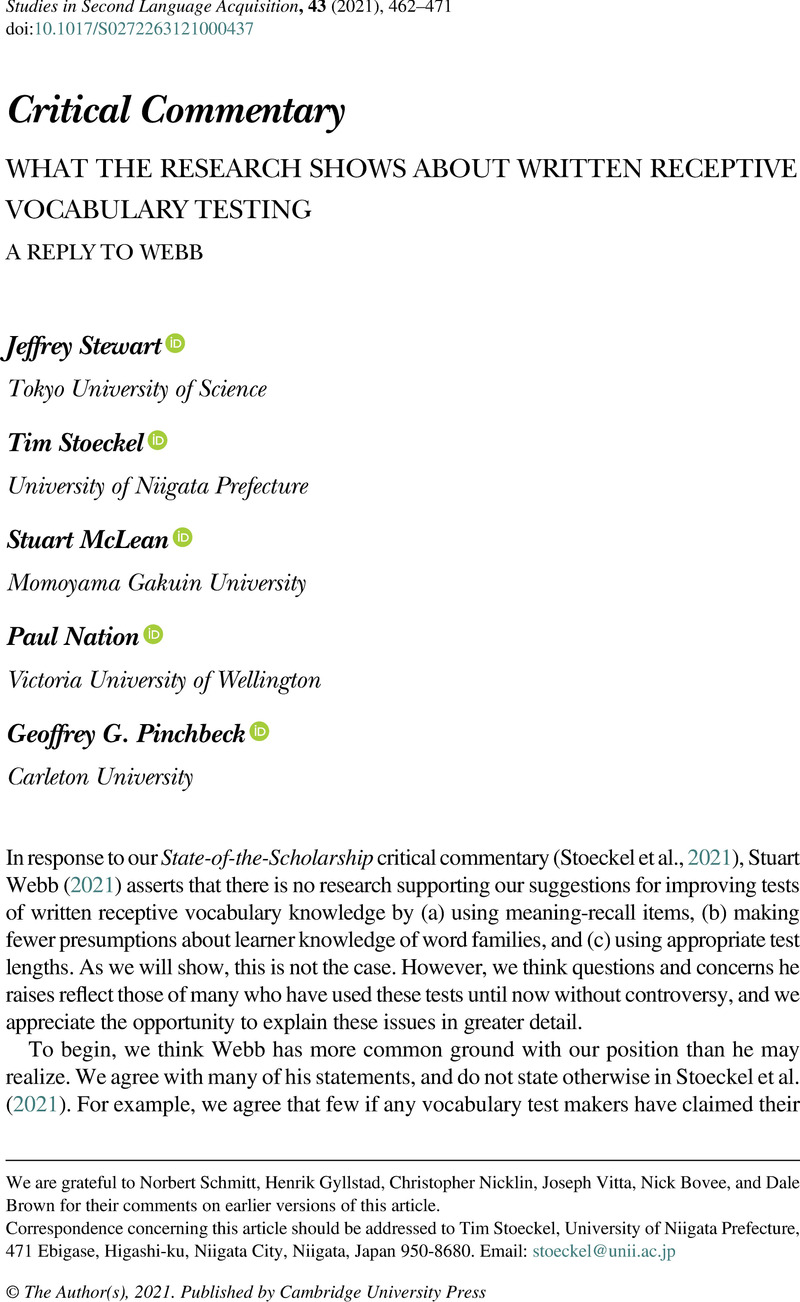Crossref Citations
This article has been cited by the following publications. This list is generated based on data provided by Crossref.
Webb, Stuart
2021.
WORD FAMILIES AND LEMMAS, NOT A REAL DILEMMA.
Studies in Second Language Acquisition,
Vol. 43,
Issue. 5,
p.
973.
Ha, Hung Tan
2022.
Issues in matching learners to their reading levels using receptive vocabulary knowledge – A closer look at the vocabulary levels tests and scoring methods.
Heliyon,
Vol. 8,
Issue. 8,
p.
e10244.
Ha, Hung Tan
2022.
Test Format and Local Dependence of Items Revisited: A Case of Two Vocabulary Levels Tests.
Frontiers in Psychology,
Vol. 12,
Issue. ,
Pinchbeck, Geoffrey G.
Brown, Dale
Mclean, Stuart
and
Kramer, Brandon
2022.
Validating word lists that represent learner knowledge in EFL contexts: The impact of the definition of word and the choice of source corpora.
System,
Vol. 106,
Issue. ,
p.
102771.
Warnby, Marcus
Malmström, Hans
and
Hansen, Kajsa Yang
2023.
Linking scores from two written receptive English academic vocabulary tests—The VLT-Ac and the AVT.
Language Testing,
Vol. 40,
Issue. 3,
p.
548.
De Wilde, Vanessa
2023.
The auditory picture vocabulary test for English L2: A spoken receptive meaning-recognition test intended for Dutch-speaking L2 learners of English.
Language Teaching Research,
p.
136216882211474.
Cheng, Junyu
Matthews, Joshua
Lange, Kriss
and
McLean, Stuart
2023.
Aural single‐word and aural phrasal verb knowledge and their relationships to L2 listening comprehension.
TESOL Quarterly,
Vol. 57,
Issue. 1,
p.
213.
Shin, Dongkwang
Lee, Jang Ho
and
Choi, Wonkyung
2023.
An exploratory study of young EFL learners’ aural and written receptive multi-word unit knowledge.
System,
Vol. 114,
Issue. ,
p.
103029.
Trang, Nguyen Huynh
Nguyen, Duyen Thi Bich
and
Ha, Hung Tan
2023.
Vocabulary Demands of Academic Spoken English Revisited: A Case of University Lectures and TED Presentations.
SAGE Open,
Vol. 13,
Issue. 1,
p.
215824402311553.
Green, Clarence
Pantelich, Melania
Barrow, Michael
Weerasinghe, Daya
and
Daniel, Rachel
2023.
Receptive vocabulary size estimates for general and academic vocabulary at a multi-campus Australian
university.
Australian Review of Applied Linguistics,
Tong, Yanli
Hasim, Zuwati
and
Abdul Halim, Huzaina
2023.
The relationship between L2 vocabulary knowledge and reading proficiency: The moderating effects of vocabulary fluency.
Humanities and Social Sciences Communications,
Vol. 10,
Issue. 1,
Stoeckel, Tim
Ishii, Tomoko
Kim, Young Ae
Ha, Hung Tan
Ho, Nam Thi Phuong
and
McLean, Stuart
2023.
A comparison of contextualized and non-contextualized meaning-recall vocabulary test formats.
Research Methods in Applied Linguistics,
Vol. 2,
Issue. 3,
p.
100075.
Iwaizumi, Emi
and
Webb, Stuart
2023.
To What Extent Do Learner‐ and Word‐Related Variables Affect Production of Derivatives?.
Language Learning,
Vol. 73,
Issue. 1,
p.
301.






